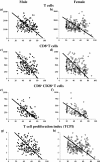Slower immune system aging in women versus men in the Japanese population
- PMID: 23675689
- PMCID: PMC3663722
- DOI: 10.1186/1742-4933-10-19
Slower immune system aging in women versus men in the Japanese population
Abstract
Background: Gender-related differences in humans are commonly observed in behaviour, physical activity, disease, and lifespan. However, the notion that age-related changes in the immune system differ between men and women remains controversial. To elucidate the relationship between immunological changes and lifespan, peripheral blood mononuclear cells from healthy Japanese subjects (age range: 20-90 years; N = 356) were analysed by using three-colour flow cytometry. The proliferative activities and cytokine-producing capacities of T cells in response to anti-CD3 monoclonal antibody stimulation were also assessed.
Results: An age-related decline in the number of T cells, certain subpopulations of T cells (including CD8+ T cells, CD4+CDRA+ T cells, and CD8+CD28+ T cells), and B cells, and in the proliferative capacity of T cells was noted. The rate of decline in these immunological parameters, except for the number of CD8+ T cells, was greater in men than in women (p < 0.05). We observed an age-related increase or increasing trend in the number of CD4+ T cells, CD4+CDRO+ T cells, and natural killer (CD56+CD16+) cells, as well as in the CD4+ T cell/CD8+ T cell ratio. The rate of increase of these immunological parameters was greater in women than in men (p < 0.05). T cell proliferation index (TCPI) was calculated from the T cell proliferative activity and the number of T cells; it showed an age-related decline that was greater in men than in women (p < 0.05). T cell immune score, which was calculated using 5 T cell parameters, also showed an age-related decline that was greater in men than in women (p < 0.05). Moreover, a trend of age-related decreases was observed in IFNγ, IL-2, IL-6, and IL-10 production, when lymphocytes were cultured with anti-CD3 monoclonal antibody stimulation. The rate of decline in IL-6 and IL-10 production was greater in men than in women (p < 0.05).
Conclusion: Age-related changes in various immunological parameters differ between men and women. Our findings indicate that the slower rate of decline in these immunological parameters in women than that in men is consistent with the fact that women live longer than do men.
Figures

Similar articles
-
Effects of [norleucine27]growth hormone-releasing hormone (GHRH) (1-29)-NH2 administration on the immune system of aging men and women.J Clin Endocrinol Metab. 1997 Nov;82(11):3590-6. doi: 10.1210/jcem.82.11.4363. J Clin Endocrinol Metab. 1997. PMID: 9360512 Clinical Trial.
-
Normal Values of T, B and NK Lymphocyte Subpopulations in Peripheral Blood of Healthy Cuban Adults.MEDICC Rev. 2019 Apr-Jul;21(2-3):16-21. doi: 10.37757/MR2019.V21.N2-3.5. MEDICC Rev. 2019. PMID: 31373580
-
[Interleukin-12 restores and promotes the T-cell immune function inhibited by 5-fluorouracil].Ai Zheng. 2007 Aug;26(8):801-8. Ai Zheng. 2007. PMID: 17697537 Chinese.
-
The immune system in extreme longevity.Exp Gerontol. 2008 Feb;43(2):61-5. doi: 10.1016/j.exger.2007.06.008. Epub 2007 Jul 4. Exp Gerontol. 2008. PMID: 17870272 Review.
-
[Deep lung--cellular reaction to HIV].Rev Port Pneumol. 2007 Mar-Apr;13(2):175-212. Rev Port Pneumol. 2007. PMID: 17492233 Review. Portuguese.
Cited by
-
Multiple vaccine comparison in the same adults reveals vaccine-specific and age-related humoral response patterns: an open phase IV trial.Nat Commun. 2024 Aug 4;15(1):6603. doi: 10.1038/s41467-024-50760-9. Nat Commun. 2024. PMID: 39097574 Free PMC article. Clinical Trial.
-
Gut microbiota as a sensor of autoimmune response and treatment for rheumatoid arthritis.Immunol Rev. 2024 Aug;325(1):90-106. doi: 10.1111/imr.13359. Epub 2024 Jun 12. Immunol Rev. 2024. PMID: 38867408 Review.
-
Chronic and Latent Viral Infections and Leukocyte Telomere Length across the Lifespan of Female and Male Individuals Living with or without HIV.Viruses. 2024 May 10;16(5):755. doi: 10.3390/v16050755. Viruses. 2024. PMID: 38793637 Free PMC article.
-
The Impact of Immune System Aging on Infectious Diseases.Microorganisms. 2024 Apr 11;12(4):775. doi: 10.3390/microorganisms12040775. Microorganisms. 2024. PMID: 38674719 Free PMC article. Review.
-
Peripheral Blood Cells From Older Adults Exhibit Sex-Associated Differences in Mitochondrial Function.J Gerontol A Biol Sci Med Sci. 2024 May 1;79(5):glae098. doi: 10.1093/gerona/glae098. J Gerontol A Biol Sci Med Sci. 2024. PMID: 38602189 Free PMC article.
References
-
- Linton PJ, Dorshkind K. Age-related changes in lymphocytes development and function. Nature Immunol. 2004;5:133–139. - PubMed
-
- Hirokawa K, Utsuyama M, Makinodan T. In: Principles and Practice of Geriatric Medicine. 4. Pathy MSJ, Sinclair AJ, Morley JE, editor. John Wiley & Sons, Ltd; 2006. Immunity and ageing; pp. 19–36.
-
- Gameiro C, Romao F. Changes in the immune system during menopause and aging. Front Biosci. 2010;2:1299–1303. - PubMed
LinkOut - more resources
Full Text Sources
Other Literature Sources
Research Materials

